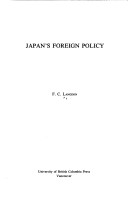In 1960 the Japan-United States security treaty was rewritten amid controversy and rancor. In the years since, Japan has astonished the world with her comeback from the status of defeated nation to a major industrial nation. This book is a detailed study of Japan's foreign policy which guided the nation in its resurgence.
Five years in the preparation, the book examines the three main pillars of Japanese foreign policy: national prosperity, national security and recognition of Japan as an international power. The author's detailed knowledge of Japanese domestic politics provides the essential background for an understanding of the nation's pursuit of its foreign objectives.
Most of the policy developments described occurred during the prime ministerhips of Hayato Ikedo and Eisaku Sato. Included is consideration of the effect on Japan of the Nixon Doctrine, through which the United States called for greater independence and self-defense on the part of its allies. Modern Japanese foreign policy is also examined against the changing balance being sought by leading world powers, as signified by U.S. President Richard Nixon's visits to Peking and Moscow in 1972 and, more recently, positive developments towards a peaceful solution to the Vietnam conflict.
Special emphasis is given to Japan's external economic policies. Japan's Foreign Policy stresses the extent to which the nation's prosperity goal has been a dominant concern, as successive cabinets balanced the economic benefits of the alliance with the U.S. against domestic pacifist pressure and the hostility of Japan's Communist neighbours.
- ISBN10 0774800151
- ISBN13 9780774800150
- Publish Date 2 February 2002
- Publish Status Out of Stock
- Out of Print 17 June 2004
- Publish Country CA
- Imprint University of British Columbia Press
- Format Hardcover
- Pages 462
- Language English
